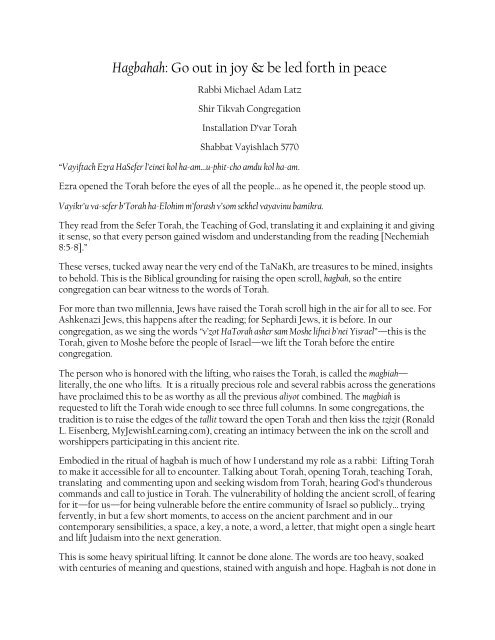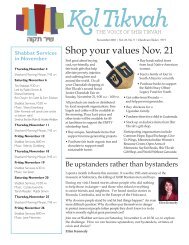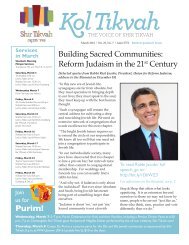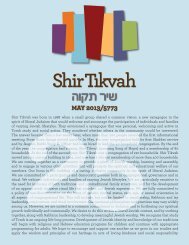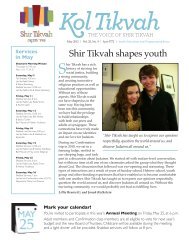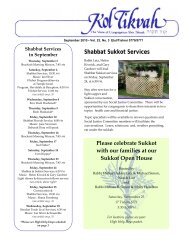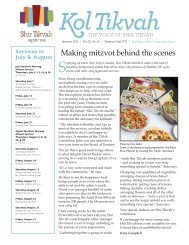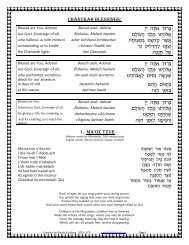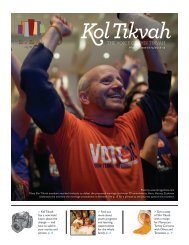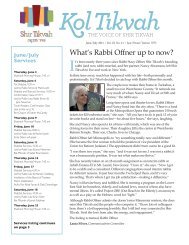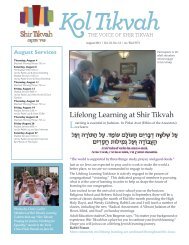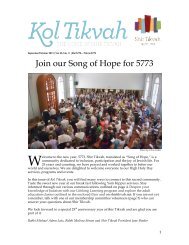Installation Sermon December 5 2009 - Shir Tikvah
Installation Sermon December 5 2009 - Shir Tikvah
Installation Sermon December 5 2009 - Shir Tikvah
You also want an ePaper? Increase the reach of your titles
YUMPU automatically turns print PDFs into web optimized ePapers that Google loves.
Hagbahah: Go out in joy & be led forth in peace<br />
Rabbi Michael Adam Latz<br />
<strong>Shir</strong> <strong>Tikvah</strong> Congregation<br />
<strong>Installation</strong> D’var Torah<br />
Shabbat Vayishlach 5770<br />
“Vayiftach Ezra HaSefer l’einei kol ha-am…u-phit-cho amdu kol ha-am.<br />
Ezra opened the Torah before the eyes of all the people… as he opened it, the people stood up.<br />
Vayikr’u va-sefer b’Torah ha-Elohim m’forash v’som sekhel vayavinu bamikra.<br />
They read from the Sefer Torah, the Teaching of God, translating it and explaining it and giving<br />
it sense, so that every person gained wisdom and understanding from the reading [Nechemiah<br />
8:5-8].”<br />
These verses, tucked away near the very end of the TaNaKh, are treasures to be mined, insights<br />
to behold. This is the Biblical grounding for raising the open scroll, hagbah, so the entire<br />
congregation can bear witness to the words of Torah.<br />
For more than two millennia, Jews have raised the Torah scroll high in the air for all to see. For<br />
Ashkenazi Jews, this happens after the reading; for Sephardi Jews, it is before. In our<br />
congregation, as we sing the words “v’zot HaTorah asher sam Moshe lifnei b’nei Yisrael”—this is the<br />
Torah, given to Moshe before the people of Israel—we lift the Torah before the entire<br />
congregation.<br />
The person who is honored with the lifting, who raises the Torah, is called the magbiah—<br />
literally, the one who lifts. It is a ritually precious role and several rabbis across the generations<br />
have proclaimed this to be as worthy as all the previous aliyot combined. The magbiah is<br />
requested to lift the Torah wide enough to see three full columns. In some congregations, the<br />
tradition is to raise the edges of the tallit toward the open Torah and then kiss the tzizit (Ronald<br />
L. Eisenberg, MyJewishLearning.com), creating an intimacy between the ink on the scroll and<br />
worshippers participating in this ancient rite.<br />
Embodied in the ritual of hagbah is much of how I understand my role as a rabbi: Lifting Torah<br />
to make it accessible for all to encounter. Talking about Torah, opening Torah, teaching Torah,<br />
translating and commenting upon and seeking wisdom from Torah, hearing God’s thunderous<br />
commands and call to justice in Torah. The vulnerability of holding the ancient scroll, of fearing<br />
for it—for us—for being vulnerable before the entire community of Israel so publicly… trying<br />
fervently, in but a few short moments, to access on the ancient parchment and in our<br />
contemporary sensibilities, a space, a key, a note, a word, a letter, that might open a single heart<br />
and lift Judaism into the next generation.<br />
This is some heavy spiritual lifting. It cannot be done alone. The words are too heavy, soaked<br />
with centuries of meaning and questions, stained with anguish and hope. Hagbah is not done in
private; Torah is lifted before the congregation, in community. So, too, with us. We must lift<br />
each other. We must support each other as we try the heavy lifting of study, tradition, ritual,<br />
and the pursuit of justice. In our holy congregation, we must also create space for others to see<br />
the uplifted scroll, to move to the side or adjust ourselves, so others, too, might see their own<br />
reflection in the radiance of Torah. The 19 th century Hasidic rabbi, Menachem Mendl of Kotzk<br />
— known as the Kotzker Rebbe—taught, “The giving of the Torah took place in the month of<br />
Sivan, but the receiving of the Torah takes place every day. The giving of the Torah was the<br />
same for everyone, but the receiving is different for each person according to his ability to<br />
understand.” (Emet Ve-Emunah).<br />
Hagbah is a call to each of us: to expose the treasures of our tradition for all to share, to learn, to<br />
seek inspiration and comfort and guidance in a world that is ever more spiritually sublime and<br />
morally complex.<br />
As a rabbi in the 21 st century—nearly 2000 years since the first rabbi was ordained—my central<br />
religious task remains as precious as it was for the students in the first seminary in Yavneh two<br />
millennia ago: To cultivate a community committed to lifelong Torah study and spiritual<br />
inquiry, to ethical and compassionate living. As our congregation’s spiritual leader, my<br />
responsibility is to call us to examine in a very practical way, how we organize our congregation,<br />
our learning, our priorities, and our resources, to lift up Torah for every soul who wishes to<br />
encounter it, who seeks a Jewish life of promise and purpose.<br />
My prayer is that our engagement with Torah will inspire great Jewish self confidence, an<br />
increased passion and commitment to lifelong Jewish learning, a smoldering prioritization to<br />
connect with community, and an unyielding commitment to justice and righteousness. As we<br />
breathe Torah to life when we chant its words, we make manifest the central mitzvot of our rich<br />
Jewish tradition and heritage: the observance of Shabbat and holy time; the Oneness of the<br />
universe and the embracing Divine Presence; the mystery of human relationships; the clarion call<br />
to care for the widow, the orphan, the poor, and the strangers in our midst. As we gather on<br />
Shabbat and raise the Torah, we proclaim a Jewish future robust with vigor and vitality. For Rav<br />
Kook proclaimed, the old shall be renewed, and the new shall be made holy.<br />
This probing study and observance of Jewish time is not merely because it enriches our souls<br />
and gives our lives meaning—though it certainly does that! Over the past two decades, led by<br />
the indefatigable Rabbi Offner, <strong>Shir</strong> <strong>Tikvah</strong> created an expansive community of radical<br />
inclusion. When asked the timeless question: Are we our brother and our sister’s keeper? <strong>Shir</strong><br />
<strong>Tikvah</strong> repeatedly answered without equivocation, “YES! We are our brother’s keeper. We are<br />
our sister’s keeper!” Time and again, on the great moral and social issues of the day—from<br />
Darfur to the treatment of Somali Refugees here in the Twin Cities, from AIDS to homelessness,<br />
from Domestic Violence to Environmental Justice—<strong>Shir</strong> <strong>Tikvah</strong> has led the way for justice. Our<br />
prayer and our study compel us to act in the world, to make God’s mitzvot and the Prophet’s<br />
vision real: to make justice roll down like waters and righteousness as a mighty stream!<br />
In our parsha this Shabbat, in the dark of night, Jacob wrestles with beings Divine and human.<br />
Confronted with the demons of his past and the truths of his life, Jacob becomes Israel. We do<br />
not become without struggle. Pain and suffering are seemingly part of the bargain for being<br />
human. An authentic religious enterprise seeks to end the suffering of God’s creation where
possible; and where it is not possible, then our Jewish tradition and community must seek to<br />
offer comfort and make the suffering sufferable. This is what a holy community is tasked to do:<br />
Build relationships of mutual care and affection, of growing support and tenderness. When one<br />
arm is unsteady, we raise ourselves up to stand beside and hold.<br />
This is our great task together in the days and months and years ahead: to create a holy<br />
community together where we receive Torah—each one of us—each and every day; to grow our<br />
understanding, to gain wisdom, to build a world together where God’s vision of equality and<br />
justice are normative and pervasive.<br />
Just as we lift Torah, so too, are we lifted, held, and strengthened by our communities of loved<br />
ones.<br />
For holding me in the past, for lifting me today, for continuing to call me to raise my sights<br />
beyond the horizon, I am grateful this Shabbat as I am formally installed as <strong>Shir</strong> <strong>Tikvah</strong>’s rabbi:<br />
To <strong>Shir</strong> <strong>Tikvah</strong>’s <strong>Installation</strong> Committee, Transition Committee, and Judy Hollander and the<br />
Rabbinic Search Committee, and Jane Newman and the Board of Trustees, I offer my thanks and<br />
deepest gratitude for your support and your trust in me for this exquisite honor. Thank you.<br />
To the <strong>Shir</strong> <strong>Tikvah</strong> staff—John, Judy, David, Holly, and Rebecca—with whom I am privileged to<br />
work each day, I give thanks and the promise of weekly staff meetings for time immemorial.<br />
To my dear friend, Nanette Robinson Goss, who came from West Seattle and who has<br />
supported my rabbinate for the past decade and helped me soar, thank you.<br />
To the rabbis present: Rabbi Saks, my friend and beloved chevruta (study partner), who walks<br />
Torah and teaches integrity; Rabbi Offner, my predecessor, teacher, exemplar, and inspiration;<br />
Rabbi Stiefel, a friend for nearly 20 years whose tender leadership and wise counsel lifted <strong>Shir</strong><br />
<strong>Tikvah</strong> to new heights; and Rabbi Zecher, the one who showered upon me a love for the<br />
congregational rabbinate, exposed me to the mystery and wonder of Jewish liturgy, and who<br />
called me to trust my soul and find my voice—your words are forever upon my lips; for you, my<br />
teachers and friends, I give thanks.<br />
To my dearest friends, Ann Kaner-Roth, Marc Roth, and Marla Eisenberg, and their families,<br />
who were as big a draw back to the Twin Cities as I could imagine, whose support over a<br />
quarter century has shaped my dreams, and whose love has enabled me to realize my visions, I<br />
offer praise and thanks.<br />
To my entire family present, most especially my parents, Larry & Judi, and my brother Benjamin<br />
& his fiancé, Brian, I’m so happy to be back and grateful for the love you’ve showed me; for<br />
teaching me that there is always enough room at the table for one more guest, that there is<br />
always enough food for one more person, always enough love to be shared, thank you.<br />
Many of you know that I was a single dad for a number of years; Noa was born during<br />
Chanukkah, as the light of a past relationship flickered and was extinguished; Liati arrived on<br />
Erev Shavuot, as the sun was setting in the Santa Monica sky and a new moon in our lives<br />
illuminated our future as a family. Life as a single, gay, rabbi, father was just about as full and<br />
complicated as you might imagine. And then Michael came into our lives, gently, with quiet<br />
commitments of affection, trust, and love. Waiting for you, my Michael, taught this very
impatient soul how magnificent life and love can be. Zeh dodi, zeh rei-i: Forever in my heart, you<br />
are my beloved and my friend.<br />
To our beloved daughters, Noa and Liati: I cannot remember what my heart felt like before you<br />
grew inside. I am awed by your love and grateful every waking hour for your sticky fingers and<br />
demand of your tired dads to read one more story and watch one more movie, sing one more<br />
song and give you just one more hug before bedtime. Nothing makes me prouder than being your<br />
dad. Thank you for teaching me what it means to be fully alive.<br />
Finally, to you, the members of <strong>Shir</strong> <strong>Tikvah</strong>, for the honor of being your rabbi, I am grateful and<br />
humbled. I pledge to you today and every day to honor the traditions and past of this holy<br />
community as we move forward and write new songs of hope for the future.<br />
A Rabbinic <strong>Installation</strong> at its ikar—at its core—is about hope, about the blossoming<br />
relationship between rabbi and congregation, about pausing at this moment to celebrate our<br />
shared commitment to move forward and continue shaping our holy community. Together, we<br />
are building upon a foundation of 21 years of tenderness, compassion, integrity, and vision. And<br />
there is still much work to be done. To secure a vital future, every one of us will be called to open<br />
our hearts, lift up our hands, share our resources, and renew the faith of <strong>Shir</strong> <strong>Tikvah</strong>’s vision.<br />
Our ancestor Jacob, in the dark night of the soul, begged to be blessed, pleaded for life from an<br />
elusive encounter with the Divine.<br />
There is no such pleading here at <strong>Shir</strong> <strong>Tikvah</strong>; we have an abundance of blessings for one<br />
another and the world. We are here, gathered together in this holy congregation, with the<br />
purpose of reaching out and blessing one another’s lives.<br />
Today is a celebration: out of many, we are one. God willing, when we look back on this season a<br />
in generation or two, I pray we will tell stories of how members of <strong>Shir</strong> <strong>Tikvah</strong> served as God’s<br />
agents, Divine messengers for justice and equality and peace; that when history called upon us to<br />
be a transformative force for good in the world, we answered in the affirmative; that we<br />
embraced every opportunity to alleviate suffering; and that we were lifelong students of Torah<br />
and beacons of hope for ourselves, our loved ones, our community, and our world.<br />
On this Shabbat, let us recommit ourselves to <strong>Shir</strong> <strong>Tikvah</strong>’s exalted vision: to be an inclusive,<br />
welcoming, dynamic, progressive synagogue community, rooted in tradition, with branches<br />
lifting us toward the heavens. Let us make a congregation and a world renewed with the vitality<br />
of Divine promise as we sing Isaiah’s hopeful melody: You will go out in joy and be led forth in peace; the<br />
mountains and hills will burst into song before you, and all the trees of the field will clap their hands.<br />
Keyn Y’hi Ratzon.<br />
Shabbat Shalom.


